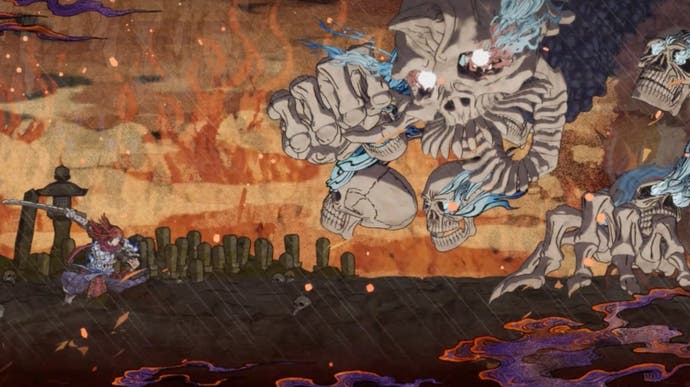Konami's comeback is a welcome deep cut - and perhaps the start of something
Going rogue.
Apologies for getting sentimental about nothing more worthy than a corporate logo but still, there's something warming about seeing the Konami logo on boot-up of a new game once again. For all the understandable frustrations about Konami's approach to traditional games in recent years - and even if the company's flat red modern splash screen can't match the iconic dashes of the 90s iteration - it's wonderful to have them back doing something they used to do so very well in the past: making straight-up, hard-edged action games.
This new roguelike platformer that's just hit Steam Early Access today is a return as surprising as it is inspired, a bonafide deep cut of a thing that reaches into Konami's peerless back catalogue and pulls up not Gradius, Castlevania, or Silent Hill but this: Getsu Fūma Den, a remake of a 1987 side-scrolling action platformer that never made its way out of Japan, and something even a wide-eyed devotee of Konami's 80s output can't pretend to have played before.
Not that there's too much similarity between the two; rather, this remake builds upon the bones of the fairly stark 2D action of the original, its multitude of weapons and crunchy combat providing the perfect backbone for everything you'll know from the modern roguelike: upon every run you're picking a build from items and artefacts you find on your way, subject to RNG and some fairly brutal enemies that might take a half dozen swipes from whatever weapon you might find in hand.
It's familiar stuff but the execution is exemplary with indie developer GuruGuru - working in tandem with Konami - letting the fantasy setting flourish through a sumptuous artstyle that channels Ukiyo-e artwork. It's a well-worn aesthetic in video games by now, from Okami through to Platinum's more recent World of Demons and well beyond, but GetsuFumaDen wears it well, its levels an ethereal fug of inky lines and splashes of colour. It's something with serious style.
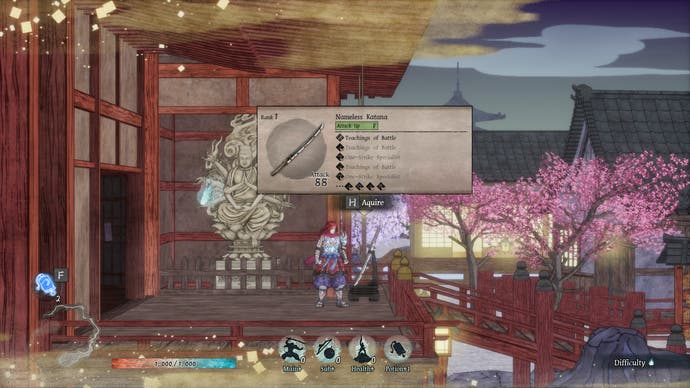
Perhaps most importantly that same style can be found in the combat, which at this early stage of GetsuFumaDen's life in Early Access seems to be the main draw. I don't know how many weapons exactly are in the current build, but I know that after a couple of hours' play I've yet to tire of the ones I've come across, from the violent flurry of the umbrella to the dumb thunk of a spiked mace, each resplendent with its own combo set and told with perfect hit pauses that show this is a game that takes its action seriously.
It's where you'll see the poise and grace of Konami's 80s greats, even if it's occasionally obscured in an Early Access release that feels understandably incomplete. The readability isn't quite there in the combat, where it's easy to lose sight of your enemy and their tells through the whirling dervish of your own actions, and where being able to effectively counter seems a touch too difficult at present. How, too, will it maintain an allure over multiple runs, and how will that all-important balance fare over more extended play?
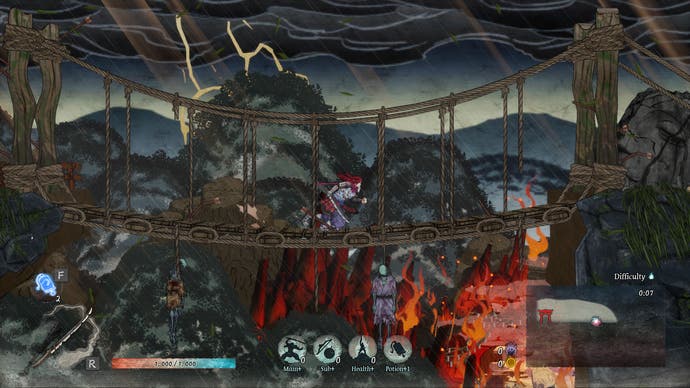
I'm not sure, and it's not the only question GetsuFumaDen poses. Is this the start of a concerted comeback from Konami, a sign that its back catalogue is now open to interested third-parties, or just that it's now back in the business of making traditional games? I put a few of those to Konami in an interview over email that you'll find below, though right now it feels like it's the first baby step before a more concerted comeback. How will it pan out for GetsuFumaDen over the course of its Early Access development, and what will it mean for Konami in the near future? I don't know for certain, but I'm fascinated to find out.
It's so wonderful having Konami back making games like this again. What are some of the reasons behind the absence from traditional games development in recent years?
Céline Combelles, brand manager at Konami Europe: Konami has continuously developed and published video game entertainment over the past five decades, though as ways to play and players got more diverse, output has definitely been more spread out on different platforms than in the past. Just last year, Konami has brought classic and new titles to new home consoles, cloud, mobile and VR devices across different regions. With several titles already announced and more to come this year, I hope that only becomes more apparent and grows with success.
It's a fascinating way to come back too - why did you pick GetsuFumaDen in particular?
Céline Combelles: The merit of surprising everyone originally goes to the production team, their creativity and undying love for all of our brands. In fact, GetsuFumaDen made sense when looking at reinvention and innovation on past successes. It's definitely a love letter to the original, but isn't limited by any script - and has an unexpected twist that just captures attention. Plus, the game artfully blends Japanese roots with western influences through gameplay and music in a way that really sets it apart. That's a common theme running through some of our most cherished titles, so building on that tradition and keeping it going was also important.
Shin Murato, producer at Konami: We started plans around this title in 2018, right when smaller, artistic indie projects with great game systems, and larger titles using Japanese themes, were becoming popular. We wanted to plan a mid-range game that was both artistic and Japanese-inspired, with a good game system. "GetsuFumaDen" fit this perfectly and had the benefit of having no sequels or global launch. We also have many fans of "GetsuFumaDen" in our team that wanted to work with the title, so, we decided to use this IP for a fun project and started making the concept of "GetsuFumaDen: Undying Moon".
Why did you elect to go for the early access route?
Céline Combelles: Early Access was a big part of titles like Hades and Dead Cells and we thought that these types of games, Getsu included, really shine when they're refined and shaped by the very players that will spend dozens of hours looping through them. Improving through trial and iteration is the goal here, and that required enabling game development to react directly to fan feedback.
Shin Murato: Early Access gives us the opportunity to improve the content of this title via user feedback. By listening to users and creating discussion, we can increase the quality of this game before opening it up for a wider audience. Any opinions on our Steam community, Discord or Twitter pages will be read by the development team and we will consider user feedback when creating new updates. Similar roguelite games to GetsuFumaDen: Undying Moon has also shown us that the genre works well for Early Access release.
What is it about the Famicom original that you're hoping to recapture with this new version?
Shin Murato: GetsuFumaDen: Undying Moon uses Konami's old IP and we kept the 2D action of the original for players that enjoyed that game. However, we want people to remember that this title is a new game, set approximately 1000 years after the original title. It is not a remaster of the original game, so many other elements are new. We want new, younger fans to enjoy this title as a new IP.
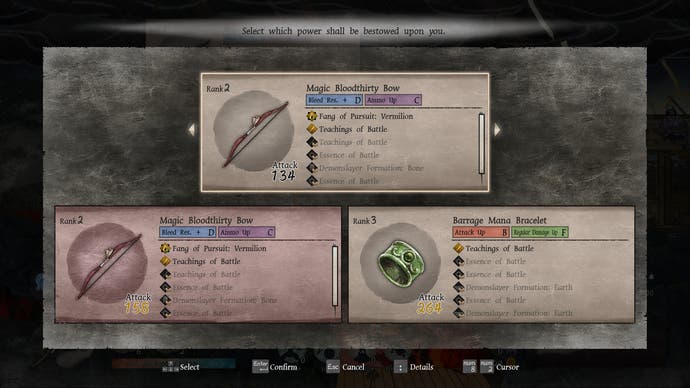
It's being made in partnership with an external developer - how much is being made internally at Konami?
Shin Murato: We can't disclose the detail, but we deeply and continuously communicate, change ideas and discuss with one another to develop this title.
What was the process for getting GetsuFumaDen off the ground - was it a pitch from an external developer?
Céline Combelles: Getting GetsuFumaDen off the ground was definitely all thanks to the hard work of Murato-san and the whole production team in Japan championing this project internally after its conception. You can imagine the surprise it was to discover the passion already evident from the efforts put into art direction and battle moves in early stages, especially for an IP that had never even landed on western shores before! When you see a project that unique being championed with conviction and determination to evolve through early stages of development, it's only natural to be inspired and give it support to continue the rest of its journey.
Shin Murato: We are continually inspired by various indie titles, and their ability to innovate and produce exciting games. We felt that GetsuFumaDen would be an interesting IP to bring back to follow this indie approach, and so we decided to contact GuruGuru as we knew the team well. They had been exploring new approaches for graphical design and thought they would be a great fit for this IP. It also helped that there were fans of the original GetsuFumaDen game within the GuruGuru team. In terms of other collaborations, please wait for the future projects like this!
Resurrecting an old IP is something that's delighted fans, and obviously Konami has one of the richest collections of classic IP in video games. Is Konami looking to work with external partners to help revive some of them too?
Céline Combelles: The beauty of true classics is that they endure the test of time, often to lit creative sparks far and wide. When time comes, we're looking forward to sharing more info about other IPs!
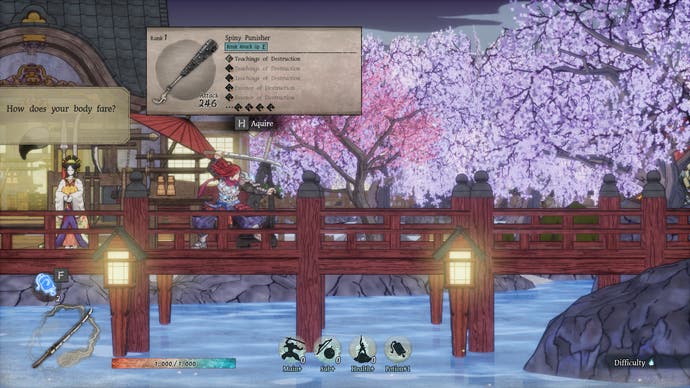
A series like Gradius is beloved but not the sort of game that has mainstream appeal - would a partnership with an independent developer help make a new one more likely? (Apologies for singling out Gradius - I'm an obsessive with an original arcade board of Gradius 2, so it's something very dear to my heart!)
Céline Combelles: There has been a real boom in the number of development studios making video games worldwide compared to when series like Gradius were first created! Collaborations or crossovers with independent developers on existing series are now much more common, so that definitely means more opportunities can open up. Since you're a fan, my belief is that GetsuFumaDen shares DNA from a few other Konami games - Gradius among them! I got familiar with GetsuFumaDen before the interface was translated, so I just dubbed the power-up system "that Gradius-like power-up bar" in my mind - and I always end up thinking about the series when I play. Now, GetsuFumaDen: Undying Moon is far from being a side-scrolling shooter and plays very differently, but I'm definitely counting on you to use the power-ups masterfully.
Is Konami looking to re-establish itself in traditional games development on a broader scale too? Is this the start of a comeback?
Céline Combelles: It's tempting to think past experiences can be brought back by repeating old motions, but beyond nostalgia what it takes to create an enduring experience in video games now is different from five years ago already, let alone decades earlier. Teams comprising of a handful of people are now making world-spanning games at such scale that I've spent hundreds of hours on, while large studios have started exploring themes and short formats that were only for independent developers not so long ago. Konami has spent more than half a century making video games already, but that doesn't mean the past holds a perfect blueprint for the future. That could be quite limiting, when video games should be anything but that. So rather than looking backwards, I think GetsuFumaDen: Undying shows we're ready to adapt and continue to reinvent our games in an industry that still needs innovation and change now, more than ever.
